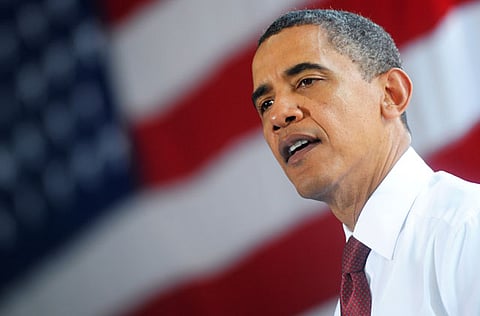Spill not Obama's fault
The BP disaster is just the latest crisis that has seen this consensus-seeking president rebuffed by the worst of partisan American politics

America's talking heads of left and right agreed that Barack Obama failed to come up with the right words in his Oval Office address last week on the BP oil spill disaster. But his bigger problem, they went on, is that he has not done the right deeds.
"For starters," said one commentator, "the underwater gusher is either contained or it is not. And right now it is not."
Those whom the gods would destroy they first make mad. And this is collective madness. By what measure of reason can any president of whatever party be held politically responsible for a catastrophic failure of hi-tech engineering?
Obama has partly got himself to blame, of course. The more he identifies himself with solving the oil spill problem, the more he looks like he owns it too. Yet by what logic is a president from a party with at least some record of environmental and corporate regulatory awareness now being besieged for failures on the ocean floor?
This is particularly egregious on the conservative right, addicted to drilling for oil, as well as committed to the absolute minimum of environmental or corporate regulation by a federal government whose activities it regards in many respects as illegitimate and unconstitutional.
Welcome, however, to American politics less than two years after the supposedly transformational once-in-a-generation election of President Obama. Welcome to an American politics in which opinion polls now show the Republicans have a chance of recapturing Congress in November's midterm elections and maybe even an outside chance of levelling the Senate.
From afar, this unravelling is hard to credit in the week when a Pew poll showed Obama is more popular abroad than at home. It is all the more remarkable given that so many of the major crises that Obama has faced in his first 18 months in office have not been of his own making but have been inherited from his predecessor.
Inherited challenges
Of the five biggest challenges that have marked the opening year and a half of Obama's presidency, three of them the wars in Iraq and in Afghanistan as well as the financial crisis all began under George Bush's presidency. The fourth, the Deepwater Horizon oil leak catastrophe, was emphatically BP's responsibility, while only the fifth, the battle for a widely supported reform of health care, was Obama's own responsibility.
However, the bulk of the explanation for the embattled mood lies with the American right's increasingly implacable warrior Marxism. That's "Marxism tendence Groucho", as one 1968 Parisian poster had it. Groucho's "Whatever it is I'm against it" could be today's Republican party anthem.
Perhaps surprisingly, the ourselves-alone conservatism of the Gingrich and Bush-era Republican party has barely faltered in spite of the 2008 election and is now accelerating once more. But the urgings of the Tea Party challenge are re-energising the increasing partisanship.
Democrats, meanwhile, were divided among themselves, as they were on health care. This speaks volumes, and not just about US politics. Political parties, not just in America, pay lip-service to the consensus of putting the national interest above party.
Parties of the left, however, find it much more difficult to define that consensus than parties of the right do. Perhaps parties of the left are more easily intimidated. Perhaps they are intellectually more reasonable. Perhaps in the end they care less. Perhaps many of the 55 per cent of white Americans who did not vote for Obama are simply unwilling to defer to a consensus proposed by a black man.
When the right is in power in a national crisis, after all, the left often defers. But when roles are reversed, the right rarely shows such deference. Imagine how the Republicans would have behaved after 9/11 if President Gore had been in charge. Or how they would act now if another such attack took place on Obama's watch.
Whatever the explanation, it is a fact that a genuine consensus seeker of the left like Obama has almost as much difficulty as a bogus one of the left like the former British premier Gordon Brown in defining the terms of any new national consensus. Meanwhile, a bogus consensus seeker like George Bush can set the terms almost as easily as a genuine one like the current British Prime Minister David Cameron.


